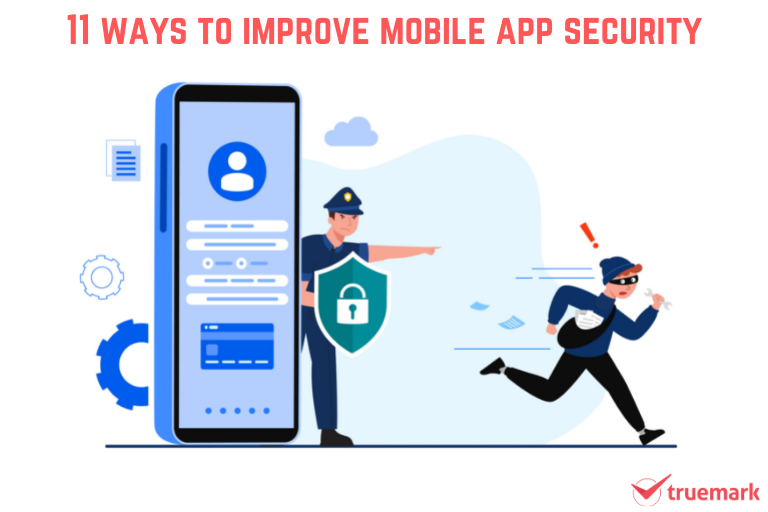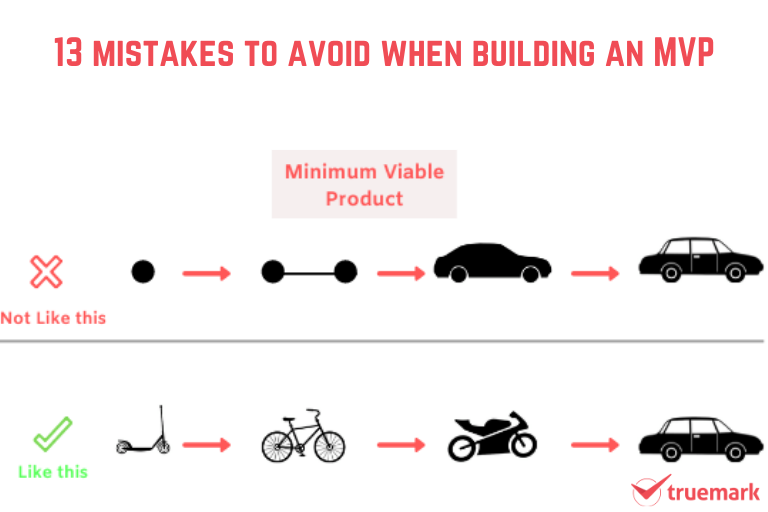Almost 15 billion mobile devices are operating in 2021, which is more than the other devices (desktops, laptops, etc.) combined. And it is expected to grow by 18.22 billion by 2021, says Statista. It is not wrong to say that smartphones have become an integral part of our lives. It has been embedded into our daily lives so deep that we cannot leave it even for a few seconds.
From contacting to emailing to texting to working, there isn’t a task that isn’t influenced by mobile devices, especially, mobile apps. They have made our life easier, but at the same time, it has become a double-edged sword. Not only their usage, but the security threats like data leakage, hacking, etc., have also increased. So, the need for mobile app security has become the highest priority nowadays because about 40% of mobile devices in the world are exposed to cyberattacks.
Today, we will talk about different ways to improve mobile app security.
First, let’s look at a few types of mobile app security threats.
Types of mobile app security threats
Malware
The first is malware, a type of malicious software that causes harm and exploits the devices. It comes in the form of ransomware, spyware, viruses, trojan, adware, etc. Out of which, ransomware is the most active and prominent security threat. Experts claim that, in 2021, ransomware will occur every 11 seconds.
Hacking
Another is hacking. Everybody knows about it, right, where hackers hack the devices (mobiles, pcs, laptops, servers, etc.) without the owners’ consent. Around 2,200 cyber-attacks occur in a day, which includes ransomware, hacking, adware, etc.
SQL Injection
SQL injection is another security threat that directly attacks data-driven applications by injecting malicious SQL code in the database query to access the data stored in the database system. It includes sensitive information, like contact info, bank details, etc.
Unsecured data storage
Unsecured data storage is a common security threat. We all have that one problem of saving our data online, thinking that they are safe. But, this activity becomes an easy target for hackers to hack our app and steal our information.
However, the biggest concern is ineffective data security measures during app development.
Cryptojacking
Cryptojacking is a cyberattack that has been increasing a lot recently, where hackers hack users’ devices to mine cryptocurrency without their consent. 25% of businesses in the world are reported to have been attacked by cryptojacking.
Now, let’s what are the causes of these cyberattacks.
Common leading factors why mobile app security fails
Poor authentication
One of the leading causes of cyberattacks is poor authentication. Cybercrimes can’t be stopped completely until and unless we prepare ourselves and don’t give a chance for hackers to attack us. And one of the mistakes is not using the strong password or fully utilizing the 2FA (Two Factor Authentication).
Most people don’t even know what 2FA is. It helps you detect if someone is trying to log in to your account by notifying you through email or push notifications.
Likewise, some people use the same password for multiple apps and accounts whereas some use a simple pin, like 12345, birth date, phone number, etc. One correct guess from the hackers can compromise all the data you have. So, setting a strong password and a different one for different accounts is a must.
App installation from an unknown source
Another common cause is installing apps from unknown sources. This mostly occurs when people don’t have enough money to pay for premium features, so they shift to downloading apps from torrents and other such untrusted platforms. Most of the apps available on them are cracked; meaning someone bypasses the app’s security measures and inserts their own set of codes. You don’t even know what code they have inserted, so the users who download such apps become easy targets for hackers to compromise their data.
Clicking unknown links
Have you ever come across links that are too good to be true, like you have won an iPhone, click the link below to get your prize? Such attacks are known as phishing. In this cyberattack, the phisher tricks the users into clicking the links. As a result, all the user’s data including credit and debit card information is compromised.
One of the famous real case examples is from between 2013 and 2015, where a phisher took advantage and tricked Facebook and Google to garner $100 million. Luckily, the criminal was arrested later.
Hundreds and thousands of phishing cases are reported every year. In 2020 alone, 75% of organizations around the world became victims and 96% of such attacks come from email.
Lack of security measures during the development phase
Last on our list is the lack of implementation of security measures during the development phase. Sometimes, the development team misses encrypting the data and writing secure source code. Likewise, not attempting authentication bypass tests, incorporating industry-standard security protocols, reviewing the code, etc., are some of the major flaws of the development team that makes the app’s security vulnerable.
Consequences of mobile app security failure
Now, let’s see the effects of mobile app security failure.
Data leakage
The first consequence is data leakage, which is obviously the aim of every hacker. It depends on them what they do by doing this, but it is not so pleasant. They take advantage of that information for their own good, like selling them at a high price. They do this by sending malware into the users’ devices through email, links, etc. Once activated, the malware sends all the data to the hackers. An example of such malware is Ginp.
Financial damage
The main motive of every hacker with bad intentions is to steal the credit and debit card details and other payment details to hack into the users’ system and make bank transactions without their consent.
Blackmail
Another consequence of mobile app security failure is blackmailing. Ransomware is a type of malware that blocks users from accessing their own data. Once the ransom is paid, they will be able to access the data. Otherwise, they have to hire an expert or use a decryption tool to remove ransomware.
Impersonation
Impersonation is a situation where a person disguises themselves as another for fraud, most probably. They gain benefits from doing it, like financial. Or, engage in criminal activities, like terrorist, hacking, etc. And the end result- you being arrested for activities you are unaware of.
Crimes and fraud
Crimes and fraud are a result of impersonation and data-stealing, where hackers engage in cybercrimes, like terrorist activities, hacking into national security defense, obtaining confidential information, ransomware, etc.
But, how to deal with all of this? Is there any solution or ways to reduce such activities, at least? We are going to discuss these in the section below.
Ways to improve mobile app security
Here are some effective ways to improve mobile app security.
Seriousness during the development process
As stated earlier, sometimes, the development team misses to test the app or use the industry-standard security guidelines, which leads to having some loopholes in the app. This makes it easier for hackers to exploit that particular weakness and steal the data. So, it is a must to be aware of such things while developing an app.
Rigorous testing
As said in the previous point, not testing the app during and after development is a grave mistake of the developers. They sometimes don’t test their code. Every day hundreds of threats occur, so the development team must test the app rigorously and update security patches occasionally to keep the app secure.
Secure backend
The development team uses different libraries, APIs, SDKs, etc., to make the back-end of an app. Before implementing such resources, the developers must ensure that they are downloaded from trusted sources.
The back-end is the core of an app that includes a database, server, scripts, etc. So, securing them from malicious attacks should be the top priority of a developer. The most important security measures include: implementing extra layers of security, SSL (Secure Socket Layer), separating database and web servers, using a firewall, etc.
Encryption
Another best way to improve mobile app security is to encrypt the source code. Encryption is a process of securing the information by making it unreadable to other users unless you have a special key or a password to decrypt the data.
The first thing a hacker attack is the app’s source code to inject their own malicious scripts to corrupt the file and steal data. Since most of the codes are on the client-side, it becomes easier for hackers to detect loopholes. So, encrypting the code is the best way to deal with such attacks.
Proper usage of platform guidelines
Not following the security protocols and guidelines is one of the biggest mistakes of developers because they provide information on how to develop your app with utmost security. They tell you how to deal with new threats. They give you an insight into what tools and technology to use to better deal with the hackers.
Moreover, platform guidelines help you know its security features and limitations. Knowing this, you will know how to code, what tools to use to make your app more secure.
Use SSL (Secure Sockets Layer) certificates
An SSL is a security protocol that keeps the Internet connection secure by creating an encrypted link between the web browser and web server. And they are targeted the most by the hackers because our passwords, contact details, etc., are stored on them. In fact, we are the ones who give permissions to save them.
SSL certificate is a digital certificate that keeps our network encrypted, keeping our data stored on web browsers and servers safe. Moreover, it safeguards customers’ data, like transaction details on an E-commerce site. If you don’t have an SSL certificate, your websites and devices connected to the network will be unsecured and vulnerable to cyberattacks.
Implementation of secure authentication
Most of us don’t have secure authentication on our devices. We simply use our birth date or phone numbers most of the time as our passwords, which becomes relatively easier for the hackers to try and hit the right one after some time. So, it is a must to use a strong password, like a combination of letters, numbers, and special characters. And we must change our passwords every 90 days to keep them more secure.
And there is the most secured one, 2FA (Two-Factor Authentication). Without your permission, no one can access your device. Even if someone tries to, you will be notified immediately through email and push notifications.
Besides, the development team must develop an app in such a way that it encourages the users to use a strong password and use 2FA. It is one of the best ways to improve mobile app security.
Verify authorization
There are times when we share our accounts and passwords with the people we know. Sometimes, we ask our friends to access our Facebook just to share a post or like one. For short-term benefits, we tend to forget the long-term consequences it may bring. What if they accidentally use them on an unsecured network?
Sharing passwords with other people is a wrong move. On the other hand, even if you have to share your resources, implement password-based or token-based authorization because hackers are always looking for opportunities to steal data. So, using different techniques to verify authorization is a must to improve mobile app security.
Avoid installing apps from unknown sources
We all might have that bad habit of downloading apps from an unknown source just to get the premium features. Not everyone, but most of us do this. No one can guarantee the security measures of such apps. There might be malicious code hidden inside the app, which might be triggered after downloading or installing it on your device. They might harm your devices and steal your data. So, one of the best ways to improve mobile app security is to stay away from such platforms.
The wise move is to always download an app from trusted sources such as Google Play Store, Apple’s App Store, Amazon Store, etc.
Avoid clicking unknown links
Never ever click unknown links because they may be ransomware, spyware, adware. Their main purpose is to lure users and steal their personal information and payment details. Upon clicking, such links activate a malicious code that either steals your data or block you from accessing them. They mostly appear in your email. So, stay away from such links.
If somethings feel suspicious, don’t click the unknown links and consult an expert about it immediately.
Prevent storing sensitive data online
Another habit of ours is to store sensitive data on web browsers and especially, cloud storage. This is a double-edged sword. Positive side- it helps you prevent from remembering every information and stores them safely. Negative side- even though they are secured and implement multiple layers of security, we cannot say they can’t be hacked. Back in 2019, phone numbers, account names, and IDs were breached, which led Facebook to pay $5 billion to Federal Trade Commission. Luckily, the issue was solved. Still, we cannot deny the fact that such a breach may not occur in the future.
There are other examples, like the cyberattack on Yahoo in 2013, where 3 billion accounts were exposed to hackers. Once Paypal users were redirected to a phishing site and lured to enter their login information, payment details, etc. We can’t say such incidents won’t occur in the future. This is a lesson to us that we must think twice before storing sensitive information online.
In Conclusion
We cannot deny the fact that mobile devices have become an integral part of our life. The moment we wake up, we reach out to our phones, first. Before sleeping, we do the same. If we don’t see or use it even for a few seconds, we feel like something big is missing from our life. This is why hackers are too much focused on hacking our smartphones because every information related to us in them, from our contact details to payment information.
We store our pictures, passwords, buy online, etc. We do all these on our smartphones and apps. One mistake can expose our data to hackers. So, keeping our devices secured has become like saving our lives. So, that is why we have listed the best ways to improve mobile app security to help developers develop a secure app and the users safeguard their data.
At Truemark, we use industry-standard security measures and guidelines to develop a secure app. We make sure that the app is thoroughly tested and passes every security protocol. User interface and experience aren’t the only things that we focus on. We give utmost priority to security equally. So, if you want a highly secure, user-friendly, and quality mobile app that resonates with your business, then feel free to contact us at any time. We would be happy to help you.



